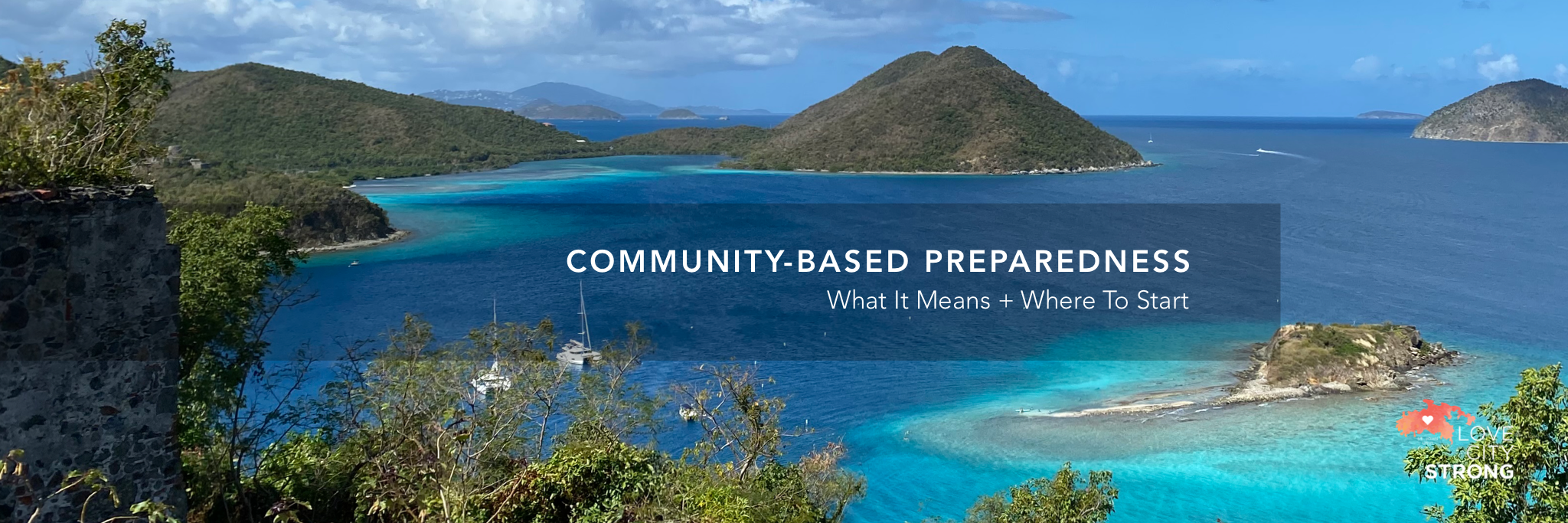
Community-Based Preparedness

At Love City Strong, we believe that a community-based approach to preparedness is critical to success in disaster response. Research and first hand experience both show that when we are more prepared as families and neighborhoods, we improve recovery outcomes.
When embraced year-round in an all-hazards context, community preparedness improves the ability of individuals and groups to limit the effects of hazard impacts and manage their resources until help arrives. As residents of island communities, isolated by definition, it is particularly important to lean into individual and community preparedness. Our communities thrive when we develop internal resources, skill sets, and commodities that help jump start response and recovery following a disaster.
According to FEMA, many people who believe themselves “prepared” have really done very little in the way of preparation. In a survey, 40 percent of respondents did not have household plans, and nearly 60 percent did not know their community’s evacuation routes. Perhaps most troubling, while 20 percent of respondents indicated that they had a disability that would affect their capacity to respond to an emergency situation, only 1 in 4 of those reported having made any arrangements specific to that disability to help them stay safe in the event of an emergency.
So where can you begin? Community preparedness has three parts: take personal responsibility, seek out training and skill building opportunities, and connect with your community.
Take Personal Responsibility
You can’t support your neighbors and friends if you are struggling yourself. Make emergency planning for your household and your family a priority. Create an emergency plan, practice it regularly, and make sure that each member of your household is taken into account, including the needs of children and pets. Household preparedness includes building an emergency kit, learning evacuation routes and shelter locations, and planning financially for hazard impacts.
Seek Out Training and Skill Building
In the event of a disaster, you may be the first help on hand for someone. There are many opportunities to build the skills necessary to be helpful in a response, from first aid and CPR to Community Emergency Response Team (CERT) training, to HAM radio operations, and much more. In the US Virgin Islands, if you’re interested in being a medical first responder, each island has a Rescue organization you can volunteer with. For all-hazards training, you can register for CERT through the Virgin Islands Territorial Emergency Management Agency (VITEMA). Another resource is your local Voluntary Organizations Active in Disaster (VOAD), which can connect you with volunteer opportunities.
Connect With Your Community
Knowing your community is key in the aftermath of a disaster. You can start small, by making sure you know your neighbors. Who has medical issues? Who has access and functional needs that might require extra support in an emergency? Connect with your church or your local community organizations to see how you may be able to volunteer. Reach out to your local business community, including Rotary and Chamber of Commerce, to start important conversations about business continuity of operations (a topic for another day!) and emergency planning. One of the most important things after a disaster is making sure resources reach those most in need, and by knowing your community, you can help ensure that happens.
Here in the US Virgin Islands, we are used to the issues that surround hurricane preparedness. What we’ve learned over the past two years as a result of the pandemic, however, is that we can’t anticipate when, what, or where the next crisis will be. The best way to make sure our communities are safer, more resilient, and more prepared, is to start close to home.
For more resources, please visit our website, www.lovecitystrongvi.org
